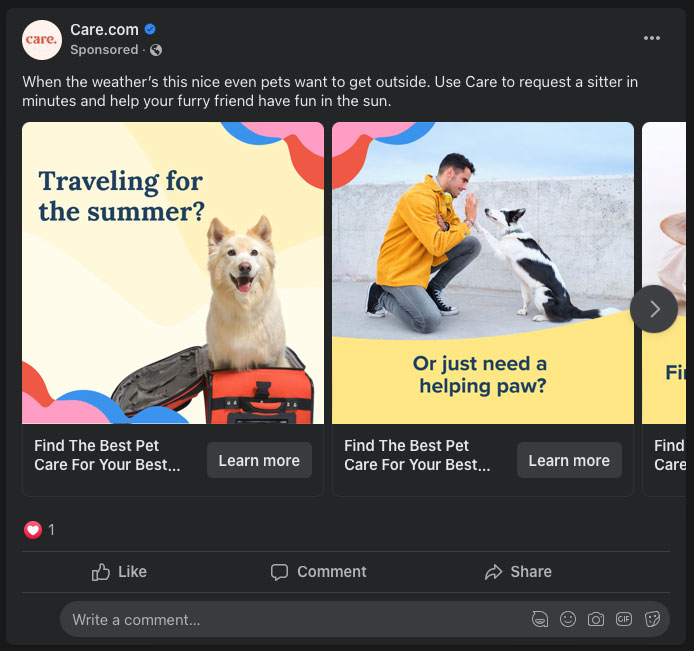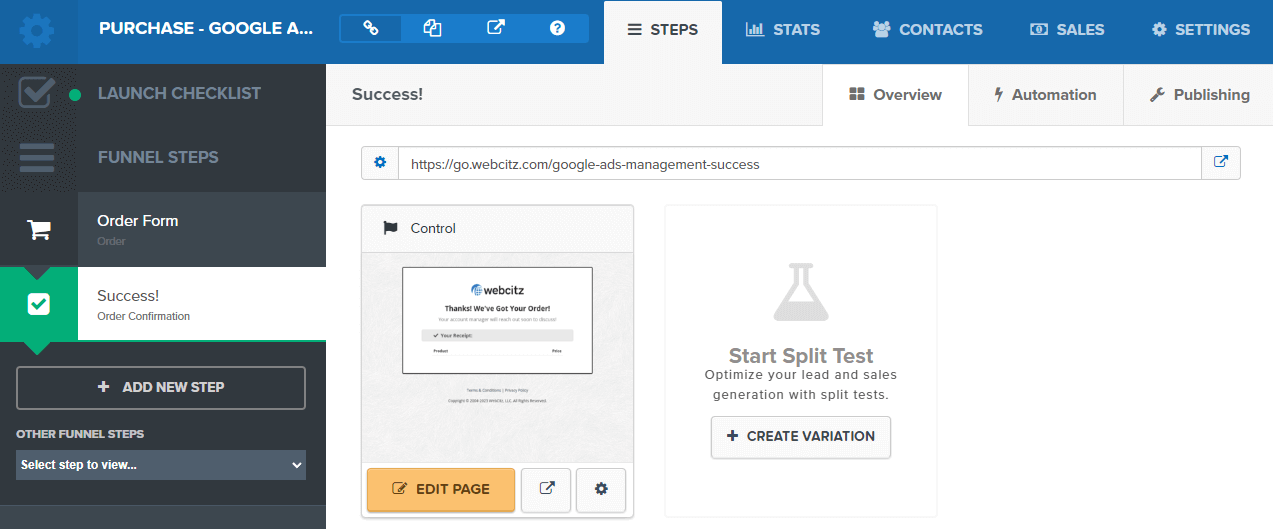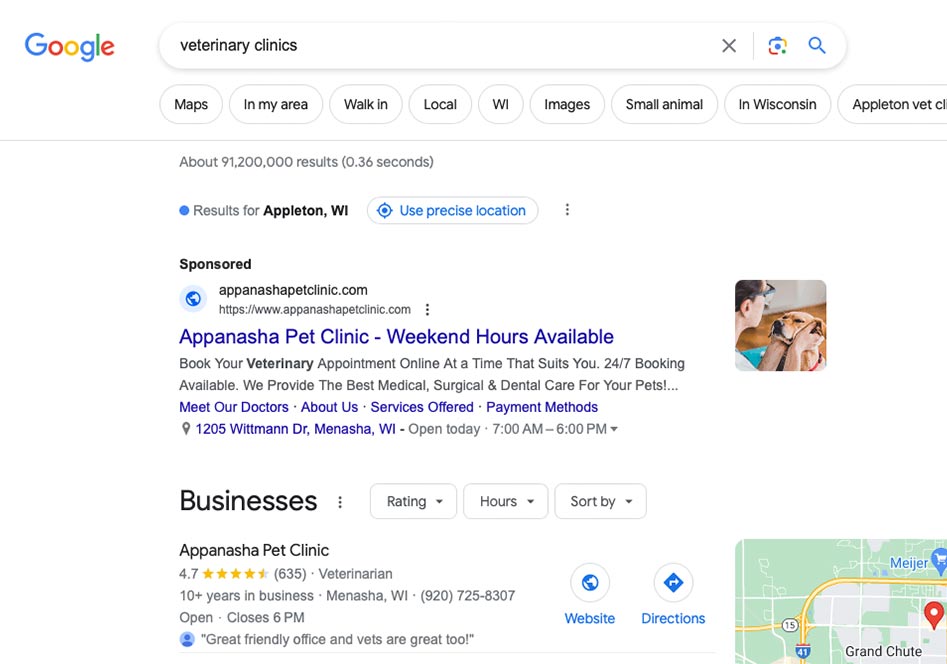Veterinarian Digital Marketing
Marketing Tips for Veterinarians
We keep updated on the latest marketing trends for veterinarians. This includes search ads, social media, email marketing, lead generation, CRO, and more!
Digital Marketing Services
Digital Marketing Tactics for Veterinary Clinics
Digital marketing for veterinary clinics involves advertising online using websites, search results, social channels, email campaigns, or even mobile apps.
Many veterinarians think internet marketing is just another term for search engine optimization or paid advertising. Even though both services are used for online advertising, neither fully describes the depth of complete website marketing plans for veterinary clinics.
Modern digital marketing campaigns include dozens of tactics, all working together to help increase visibility and conversions for your veterinary clinic.
Let's discuss what our internet advertisers have found to work best for those in this industry!






50+ Online Marketing Tactics for Veterinarians
We're a team of website marketing specialists with deep knowledge of digital marketing needs for veterinary clinics.
For years, our team has assisted veterinarians with their digital marketing goals. The strategies / tactics discussed in this section can help with digital marketing for veterinarians and even:
- Animal Hospitals
- Emergency Veterinary Clinics
- Mobile Veterinary Services
- Specialty Veterinary Clinics
- Holistic Veterinary Clinics
- Equine Veterinary Clinics
- Small Animal Clinics
- Veterinary Diagnostic Laboratories
- Veterinary Dental Clinics
- Veterinary Ophthalmology Clinics
- Veterinary Dermatology Clinics
- ...and more!
A Few of Our Digital Marketing Experts






1.) Lead Generation for Veterinarians
Lead generation is a vital digital marketing strategy for veterinarians, helping them attract pet owners and grow their client base. By implementing effective lead generation techniques, veterinarians can connect with individuals who are actively seeking veterinary services for their furry companions. Here are several tailored examples to help veterinarians generate more leads:
- Create Informative Pet Care Blog: Develop a blog on your website that provides valuable information about pet care, health tips, and common veterinary concerns. Share practical advice and solutions to attract pet owners who are actively searching for guidance and position yourself as an expert in the field.
- Offer Free Pet Health Checklists or E-books: Create free downloadable resources such as pet health checklists, e-books, or guides that pet owners can access in exchange for their contact information. These resources should offer insights and recommendations for maintaining their pets' well-being, nurturing leads interested in proactive pet care.
- Host Webinars on Pet Health Topics: Organize webinars or online workshops where pet owners can learn about specific pet health concerns or preventive care measures. Promote these educational sessions through social media and targeted advertising to attract leads seeking expert advice on pet health and wellness.
- Collaborate with Local Pet Influencers: Identify influential pet bloggers, social media personalities, or local pet communities. Collaborate with them on sponsored content, guest posts, or social media takeovers to tap into their engaged audience and generate leads who resonate with their pet-related content.
- Provide Interactive Symptom Checkers: Develop an interactive symptom checker tool on your website that allows pet owners to input their pets' symptoms and receive general advice or recommendations. Collect their contact information in the process and follow up with personalized guidance or appointment offers based on their pets' needs.
- Optimize Your Website for Local SEO: Utilize search engine optimization techniques to improve your website's visibility in local search results. Include location-specific keywords, create localized content, and ensure your contact information is prominently displayed to attract leads in your geographic area.
- Run Social Media Contests: Launch contests on social media platforms where pet owners can enter by sharing photos or stories of their pets. This generates engagement and encourages participants to provide their contact information. Offer prizes such as free consultations or pet care packages to entice participation and capture leads.
- Offer Free Initial Pet Health Consultations: Provide complimentary initial consultations where pet owners can discuss their pets' health concerns or ask questions. Advertise this offer on your website, social media channels, and through targeted online ads to attract leads seeking professional veterinary advice.
- Create Engaging Pet-related Videos: Produce short videos featuring pet care tips, grooming techniques, or answers to frequently asked questions. Share these videos on social media platforms to engage with pet owners and drive them to your website or contact form, converting them into leads.
- Participate in Local Pet Events: Attend local pet events, adoption drives, or community gatherings where you can set up a booth or provide educational talks. Interact with pet owners, distribute brochures or business cards, and collect leads who are actively interested in pet care and veterinary services.

2.) Social Advertising for Veterinarians
As a veterinarian, social advertising can be a powerful digital marketing strategy to reach pet owners, promote your veterinary services, and establish your practice as a trusted pet care provider. Here are five examples of how social advertising can help your veterinary business:
- Promote Preventive Care: Use social media ads to educate pet owners about the importance of preventive care for their pets. Create ads that highlight the benefits of regular check-ups, vaccinations, and parasite prevention, encouraging pet owners to schedule appointments for their furry companions.
- Introduce New Services: Launch ads to introduce new services or advanced treatments that your veterinary clinic offers. For example, if you've started offering laser therapy or acupuncture for pets, create ads that explain the benefits and showcase how these services can improve pets' well-being.
- Share Success Stories: Feature success stories of your patients who have undergone treatment or surgery at your clinic. Use social media ads to share heartwarming stories of pets who have recovered from illnesses or injuries with the help of your expertise and care.
- Target Local Pet Owners: Utilize local targeting to reach pet owners in your area. For instance, create ads that are specific to your city or neighborhood, and highlight your clinic's convenient location, parking, and extended hours to attract nearby pet owners.
- Promote Pet Health Education: Run ads to share valuable pet health tips and educational content. For example, create short videos or infographics that provide tips on pet nutrition, dental care, or grooming. By providing helpful information, you can position your clinic as a reliable source of pet care knowledge.

3.) Conversion Rate Optimization (CRO) for Veterinarian Clinics
Conversion rate optimization is an essential digital marketing strategy that can significantly benefit your veterinarian clinic. By optimizing your website and advertising efforts, you can increase appointment bookings and conversions, ultimately growing your client base. Here are some examples of how CRO can help your veterinarian clinic get more conversions:
- Clear Call-to-Action (CTA): Place prominent and clear CTAs on your website and paid ads, encouraging visitors to schedule appointments or contact your clinic. A straightforward CTA can help potential clients take the desired action with ease.
- Mobile-Optimized Website: Ensure your website is mobile-friendly and easy to navigate on smartphones and tablets. Many pet owners search for veterinary services on their mobile devices, and a mobile-optimized website can improve user experience and increase conversions.
- Online Appointment Booking: Implement an online appointment booking system that allows pet owners to schedule visits conveniently. Offering a hassle-free booking process can encourage more pet owners to choose your clinic for their pets' healthcare needs.
- Pet Health Resources: Provide valuable and informative content on your website, such as pet care tips, FAQs, and educational articles. Offering helpful resources can establish your clinic as a trusted authority and attract more pet owners to your services.
- Client Testimonials: Display positive testimonials and reviews from satisfied pet owners. Testimonials can build trust and credibility, reassuring potential clients that your clinic provides excellent care for their beloved pets.
- Promote Specialized Services: Highlight any specialized services or treatments your clinic offers, such as dental care, exotic pet care, or senior pet care. Specific promotions can attract pet owners seeking these specialized services.
- Targeted Paid Advertising: Run targeted paid advertising campaigns to reach pet owners in your local area. Geo-targeted ads can ensure your clinic's ads are seen by pet owners in your vicinity, increasing the chances of conversion.
- Chat Support: Implement a live chat support feature on your website to assist potential clients with inquiries in real-time. Quick and helpful responses can instill confidence in your clinic and lead to more appointment bookings.
- Newsletter Sign-ups: Offer a newsletter sign-up option on your website to capture email leads. Sending regular newsletters with informative content and special offers can nurture leads and turn them into loyal clients.
- Community Engagement: Engage with the local pet community through events, sponsorships, or partnerships. Active community involvement can raise awareness about your clinic and attract new clients through word-of-mouth referrals.
4.) Sales Funnels for Veterinary Clinics
As a veterinary clinic owner, implementing sales funnels into your digital marketing strategy can help you attract potential pet owners, showcase your clinic's services, and convert leads into loyal clients. Sales funnels allow you to guide pet owners through a personalized journey from initial interest to booking an appointment. Here are 5 examples of how sales funnels can benefit your veterinary clinic:
- Pet Health Guide Funnel: Create a comprehensive guide on pet health and wellness. Use social media ads and email marketing to target pet owners who might be seeking information on pet care. Offer the free downloadable guide in exchange for their email address. Follow up with a series of nurturing emails that provide valuable tips on keeping pets healthy and highlight the services your clinic offers. Offer a limited-time discount on a wellness check-up to encourage them to schedule an appointment for their furry friend.
- Puppy/Kitten Care Funnel: Reach out to new pet owners who recently adopted a puppy or kitten. Use social media platforms and email marketing to connect with these new pet parents. Develop a landing page that offers a special puppy/kitten care package that includes vaccinations, spaying/neutering options, and training resources. Send follow-up emails that provide more information on the importance of early pet care and the benefits of your clinic's specialized services for young pets. Offer a discount on the care package to encourage them to choose your clinic for their pet's health needs.
- Surgical Procedure Funnel: Target pet owners whose pets might require surgery or a specific medical procedure. Use social media ads and email marketing to reach pet owners seeking information on surgical options. Create a landing page that explains the different surgical procedures your clinic offers and highlights your experienced veterinary team. Send personalized follow-up emails that provide testimonials from satisfied pet owners who have had successful surgical experiences at your clinic. Offer a complimentary pre-surgical consultation to ease their concerns and build trust.
- Senior Pet Care Funnel: Connect with pet owners who have senior pets and might be looking for specialized care. Use social media platforms and email marketing to target this demographic. Develop a landing page that emphasizes your clinic's expertise in senior pet care and offers senior pet health packages that include regular check-ups and age-appropriate screenings. Send follow-up emails that provide educational content on caring for senior pets and showcase the compassionate approach your clinic takes with older animals. Offer a discounted senior pet health package to encourage pet owners to choose your clinic for their aging pet's needs.
- Emergency Care Funnel: Reach out to pet owners who might require emergency veterinary care. Use social media ads and email marketing to connect with this audience. Develop a landing page that outlines your clinic's emergency services and emphasizes the availability of skilled veterinarians around the clock. Send follow-up emails that provide guidance on recognizing pet emergencies and explain the steps to take when facing a pet health crisis. Offer a special discount on emergency care services to show your commitment to pet well-being.

5.) Email Marketing for Veterinarian Clinics
With email marketing, you can connect with pet owners, educate them about pet care, and build lasting relationships with your furry patients and their families. Here are six examples of how email marketing can benefit your veterinarian clinic:
- Pet Health Tips and Reminders: Use email marketing to share pet health tips and reminders with your clients. Send regular emails with seasonal pet care advice, vaccination reminders, and preventive care tips to help pet owners ensure their pets stay healthy and happy.
- Appointment Reminders: Send automated appointment reminders via email to reduce no-shows and ensure pet owners don't miss their scheduled visits. This will help keep your clinic's schedule organized and improve overall efficiency.
- Promote Special Services: Inform your email subscribers about any new or specialized services your clinic offers. Whether it's pet grooming, dental care, or nutritional counseling, email marketing allows you to promote these services and increase their uptake.
- Client Testimonials and Success Stories: Share heartwarming client testimonials and success stories through email. Positive feedback from satisfied pet owners can instill trust and confidence in your clinic's expertise, encouraging new clients to choose your services.
- Seasonal Pet Campaigns: Run seasonal pet campaigns and promotions through email marketing. Offer discounts on pet care products during holidays or create packages for specific seasons, such as flea and tick prevention during the summer months.
- Community Engagement: Engage with your local community through email newsletters. Share stories of your clinic's involvement in community events, charity drives, and pet adoption initiatives. This fosters a sense of connection and goodwill among your clients and potential customers.

6.) Search Advertising for Veterinary Clinics
As a veterinary clinic owner, you understand the importance of reaching pet owners in need of your services. Search advertising is a powerful digital marketing strategy that allows you to connect with pet owners who are actively searching for veterinary services for their beloved animals. Here are five examples of how search advertising can help your veterinary clinic:
- Emergency Veterinary Ads: Create search ads targeting keywords like "emergency vet near me" or "24-hour animal hospital." This will ensure that your veterinary clinic appears at the top of search results when pet owners are urgently seeking immediate medical attention for their pets.
- Pet Wellness Checkup Ads: Utilize search advertising to promote pet wellness checkups and preventive care services. Target keywords like "pet vaccinations" or "annual pet exams" to attract responsible pet owners looking to keep their furry companions healthy and up-to-date on vaccinations.
- Pet Dental Care Ads: Dental health is essential for pets, too. Create search ads targeting keywords like "pet dental cleaning" or "dog teeth cleaning near me." Highlight your veterinary clinic's expertise in dental care to attract pet owners concerned about their pets' oral health.
- Senior Pet Care Ads: Many pet owners have senior pets that require specialized care. Use search advertising to target keywords like "veterinary care for senior dogs" or "elderly cat health check." Showcase your clinic's experience in providing compassionate care for aging pets.
- Pet Surgery and Procedures Ads: If your veterinary clinic offers specialized surgeries or procedures, create search ads targeting relevant keywords like "spay and neuter clinic" or "pet surgery specialists." This will help you attract pet owners seeking specific medical treatments for their animals.

7.) Content Marketing for Veterinary Clinics
As a veterinary clinic, content marketing can be a highly effective digital marketing strategy to attract and educate pet owners. By providing valuable and informative content about pet care, health, and wellness, you can establish your clinic as a trusted resource and attract potential clients. Here are five examples of how content marketing can benefit your veterinary clinic:
- Pet Health Blog: Create a blog on your website where you regularly publish articles on various pet health topics. Offer advice on preventive care, common pet illnesses, nutrition, and behavior. By addressing pet owners' concerns and questions, you can position your clinic as a reliable source of information, which may lead to more pet owners seeking your services.
- Client Testimonials: Showcase positive testimonials and stories from satisfied clients. Include photos of happy pets and their owners. Testimonials can build trust and demonstrate the quality of care your clinic provides. Share these testimonials on your website and social media to reach a wider audience.
- Video Content: Produce informative and engaging videos related to pet care. For example, you can create videos on how to administer medication to pets, tips for grooming, or interviews with your veterinarians discussing common pet health issues. Videos can capture attention and provide valuable visual content for pet owners.
- Pet Adoption Stories: Share heartwarming stories of successful pet adoptions from your clinic. Highlight the journey of rescued pets and their transformation after receiving care at your clinic. This type of content not only promotes pet adoption but also showcases your clinic's commitment to animal welfare.
- Seasonal Pet Safety Tips: Create content specific to each season, providing pet owners with safety tips for holidays, weather changes, and outdoor activities. For example, during summer, you can offer advice on preventing heatstroke in pets, and during winter, you can share tips on protecting pets from cold weather hazards. Such content demonstrates your clinic's expertise and genuine care for pets' well-being.

8.) Reputation Management for Veterinarians
As a veterinarian, your reputation is essential for attracting new clients and retaining existing ones. Reputation management is a crucial digital marketing strategy that focuses on building and maintaining a positive perception of your veterinary practice online. Potential pet owners heavily rely on online reviews and ratings when choosing a veterinarian for their beloved pets. Here are five examples of how reputation management can help your veterinary business:
- Respond to Client Reviews: Regularly monitor and respond to client reviews on platforms like Google, Yelp, and social media. Address both positive and negative reviews professionally and with empathy. Responding to reviews shows that you value client feedback and are committed to providing excellent service.
- Showcase Client Testimonials: Collect testimonials from satisfied pet owners and feature them on your website and social media pages. Testimonials act as social proof and can instill trust in potential clients who are considering your veterinary services. Hearing positive experiences from other pet owners can encourage new clients to choose your practice.
- Provide Educational Content: Share valuable and educational content on your website and social media platforms. This content can include pet care tips, health advice, and information about common pet illnesses. By positioning yourself as an expert in the field, you enhance your reputation as a knowledgeable and caring veterinarian.
- Offer Exceptional Customer Service: Strive to provide exceptional customer service at every touchpoint with pet owners. From the initial phone call to the appointment and follow-up, ensure that pet owners feel heard, valued, and well-informed. Positive word-of-mouth referrals from satisfied clients can significantly impact your reputation.
- Engage with Pet Owners on Social Media: Be active on social media platforms where pet owners are present. Share heartwarming stories about successful treatments, post photos of happy and healthy pets, and respond to comments and messages promptly. Building a strong online presence and fostering a sense of community can positively influence your reputation.

9.) Video Marketing for Veterinarians
As a veterinarian, video marketing can be a highly effective digital strategy to connect with pet owners, educate them about pet care, and promote your veterinary services. Videos offer a visual and engaging way to showcase your expertise and create a personal connection with your audience. Here are five examples of how video marketing can help your veterinary business:
- Pet Care Tips: Create informative videos that provide pet owners with valuable tips on caring for their pets. You can cover topics such as grooming, nutrition, exercise, and preventive healthcare. By offering helpful advice, you position yourself as a trusted source of pet care information and attract potential clients seeking expert guidance.
- Meet the Veterinarian: Introduce yourself and your team through a "Meet the Veterinarian" video. Share your qualifications, experience, and passion for animals. This helps build trust and familiarity with your practice, making pet owners more comfortable bringing their beloved pets to your clinic.
- Behind-the-Scenes Clinic Tour: Take viewers on a virtual tour of your veterinary clinic. Showcasing your clean and welcoming facilities, state-of-the-art equipment, and caring staff can ease any anxiety pet owners may have about visiting the vet. It also provides insight into the quality of care you offer.
- Success Stories: Share heartwarming stories of successful pet treatments and recoveries. Testimonial videos from satisfied clients whose pets have been healed or received exceptional care can be incredibly compelling. These stories demonstrate your dedication to animal welfare and showcase your clinic's positive impact.
- Pet Education Series: Develop a video series covering common pet health issues and conditions. Each video can focus on a specific topic, such as dental care, parasite prevention, or senior pet care. Providing in-depth information on these subjects positions your clinic as an authority in veterinary care and encourages pet owners to schedule check-ups and treatments.







